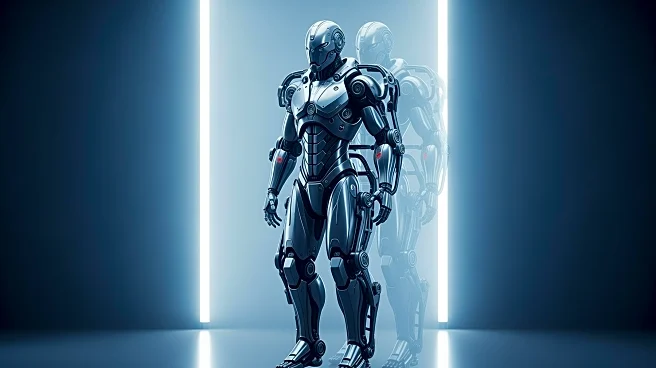What's Happening?
Wandercraft, a developer of self-balancing exoskeletons, has received its second FDA clearance for the Atalante X exoskeleton, expanding its indications and features for rehabilitation use. This clearance follows a recent CE Mark certification, allowing
the device to be used for a wider range of neurological conditions, including tetraplegia and tetraparesis. The Atalante X is now authorized for individuals with spinal cord injuries from levels C4 to L5 and those with multiple sclerosis, broadening access to hands-free gait therapy. The exoskeleton, powered by AI refined through extensive simulations, offers upright motion and walking independence for individuals with severe mobility impairments. Wandercraft's technology is deployed in over 100 rehabilitation centers worldwide, enabling thousands of patients to take millions of steps monthly.
Why It's Important?
The FDA's clearance of Wandercraft's Atalante X exoskeleton marks a significant advancement in neurorehabilitation, potentially transforming the lives of individuals with severe mobility impairments. By providing access to upright, hands-free gait therapy, the device offers benefits such as improved cardiovascular health, bone density, and psychological well-being. This development could lead to increased adoption of exoskeleton technology in rehabilitation centers, enhancing patient outcomes and expanding therapeutic options for conditions like spinal cord injuries and multiple sclerosis. The clearance also underscores the growing role of AI in healthcare, driving innovation in medical devices and rehabilitation practices.
What's Next?
With the expanded FDA clearance, Wandercraft is poised to increase the deployment of its Atalante X exoskeleton in rehabilitation centers across the U.S., potentially reaching more patients in need of advanced gait therapy. The company may continue to refine its technology, incorporating feedback from clinical trials and user experiences to enhance the device's functionality and accessibility. As the exoskeleton gains traction, healthcare providers and rehabilitation specialists might explore new applications and protocols to maximize its therapeutic benefits. Additionally, Wandercraft's success could inspire further investment and research in the field of robotic rehabilitation devices.
Beyond the Headlines
The clearance of the Atalante X exoskeleton raises important ethical and accessibility considerations in the field of robotic rehabilitation. As advanced technologies become more integrated into healthcare, discussions around equitable access and affordability for patients with mobility impairments may intensify. The use of AI-driven devices also prompts considerations regarding data privacy and the ethical implications of machine learning in patient care. Long-term, the integration of exoskeletons into rehabilitation practices could lead to shifts in how mobility impairments are treated, potentially redefining standards of care and patient expectations.














